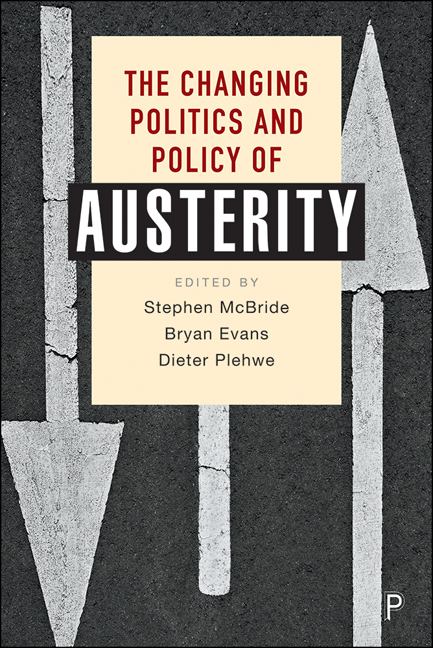Book contents
- Frontmatter
- Contents
- List of figures and tables
- Notes on contributors
- Acknowledgements
- Introduction
- PART I Austerity and the promotion of the private
- PART II Coping and casualties: labour and the social
- PART III Beyond coping: protest, pathologies and the development of real alternatives
- Conclusion
- Index
1 - Beyond austerity: pro-public strategies versus public-private partnership scandals
Published online by Cambridge University Press: 13 May 2022
- Frontmatter
- Contents
- List of figures and tables
- Notes on contributors
- Acknowledgements
- Introduction
- PART I Austerity and the promotion of the private
- PART II Coping and casualties: labour and the social
- PART III Beyond coping: protest, pathologies and the development of real alternatives
- Conclusion
- Index
Summary
Three decades of neoliberal era spending restraint have left countries around the world with a public infrastructure investment crisis. By 2030, according to one prominent estimate, the global need for infrastructure spending will total US$57 trillion (McKinsey Global Institute 2013). This infrastructure investment crisis comes at a time of renewed austerity with governments of all stripes committed to balancing budgets and paying down debt in the wake of the 2008 GFC. Recent austerity matches well-established neoliberal currents, coalescing to reconfigure sources of revenue for public works such as drawing on private finance to pay for state infrastructure through public-private partnerships (PPPs), and the further institutionalization of PPP through new generation initiatives like the Canada Infrastructure Bank.
However, as explored here, the normalization of PPPs today ignores a long run, scandalous track record: market monopolization by corrupt and inept private partners, troublesome bankruptcies and bailouts, and national revenue extraction through private partner equity rights and offshoring practices. Thus the chapter argues that alternatives to austerity require not only more spending, but also new types and sources of spending – namely, finding alternatives to private financing for public infrastructure. Alternative strategies include enacting ‘pro-public’ reforms to public sectors and mobilizing national sources of pooled savings for community-oriented purposes. The effects of the 2020 pandemic pandemonium are equally significant though they appear at this stage to be following familiar lines with governments encouraging PPPs despite their drawbacks, and the need for enhanced commitments to pro-public strategies being all the more dire.
Austerity and public infrastructure
Austerity is a clear example of what Jacob Hacker (2006) calls the ‘neoliberal risk shift’: some groups in society benefit but most are left worse off. A technical definition of austerity budgeting would refer narrowly to reductions made in the cyclically adjusted fiscal deficit; seen from a wider perspective, changes in fiscal policy greatly influence both state and society. Austerity is, as Jamie Peck (2013, 4) suggests, a strategy of redistribution that pushes ‘the costs, risks, and burdens of economic failure onto subordinate classes, social groups and branches of government’. Along with cuts to public sector jobs, pensions and other forms of spending, the sale/lease of public assets is a major facet of austerity-related restructuring (Whiteside et al 2021).
- Type
- Chapter
- Information
- The Changing Politics and Policy of Austerity , pp. 25 - 41Publisher: Bristol University PressPrint publication year: 2021



